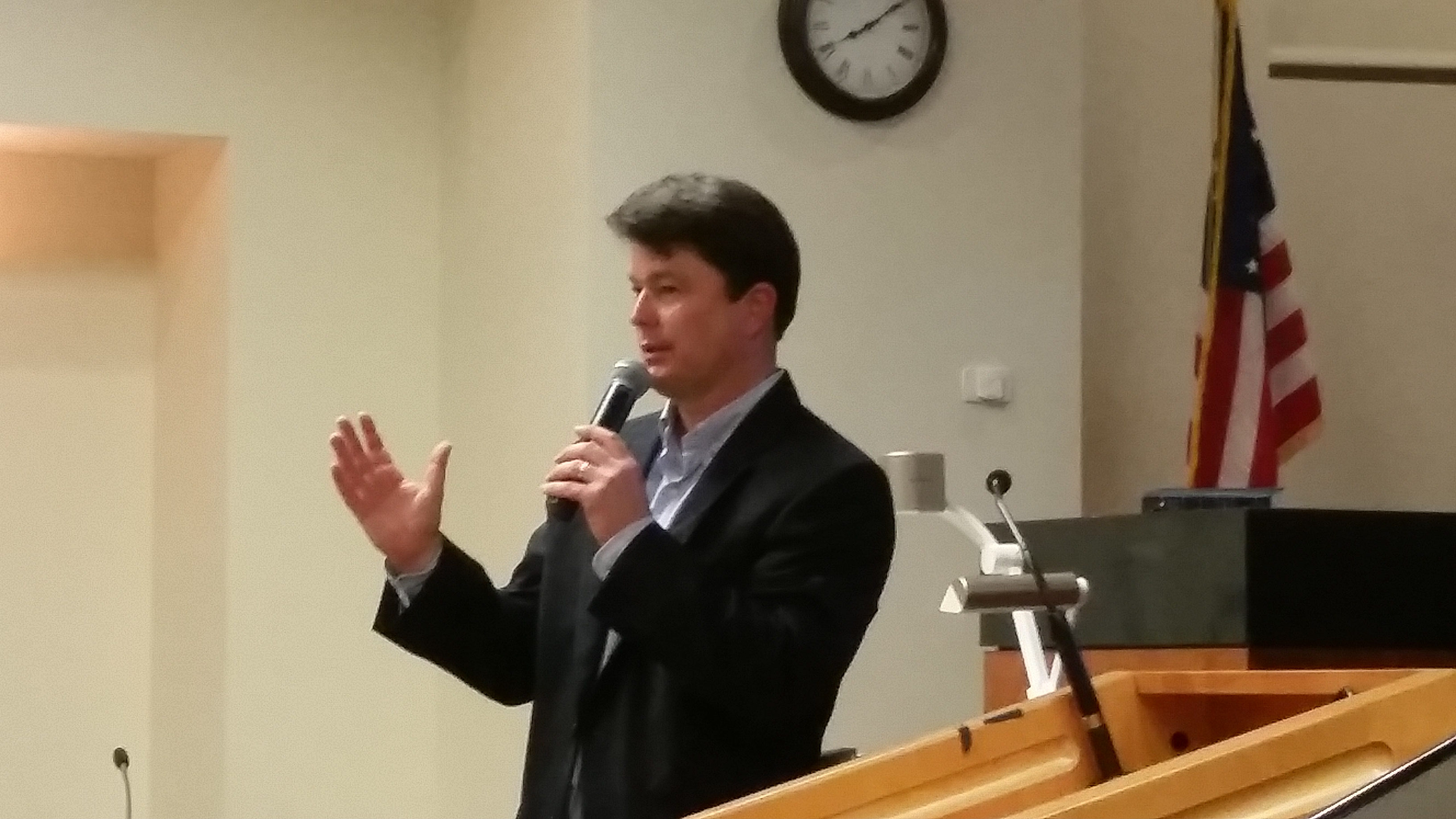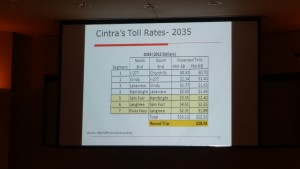Citizen Kurt: WidenI-77 organizer wows top politicians

Photo: Kurt Naas explains Cintra finances to a crowd of 150 at Cornelius Town Hall
March 10. By Dave Yochum. Speaking to a packed house—150 citizens and elected officials at Cornelius Town Hall—anti-toll leader Kurt Naas started by thanking people for attending a dry information session on Cintra finances, the bankruptcy in Texas and the pricing plan for tolls between Charlotte and Lake Norman.
The one-hour presentation by the founder of WidenI-77.org was riveting.
Elected officials attending the Naas briefing included NC Rep. John Bradford; Huntersville Commissioners Daniel Boone, Danny Phillips, Charles Guignard and Mark Gibbons; Mecklenburg County Commissioner Jim Puckett; and Cornelius Commissioners Michael Miltich and Dave Gilroy.
Bradford, as well as many attendees, clapped when Commissioner Gilroy thanked Naas for his steadfast work untangling the 900-page NCDOT-Cintra contract and unraveling financial details from a half-dozen public-private partnership and toll failures from Indiana to Texas.
Naas said bankruptcies and defaults are a vital part of Cintra’s long-range business plan. Lest people doubt Naas, he was among the very first people, a private citizen at that, to declare the NCDOT-Cintra Public Private Partnership fatally flawed, much to the consternation of many elected officials three years.
The general population surely looks like they agree with Naas. In spite of the people, the NCDOT and Gov. Pat McCrory have been just as steadfast in their support of a 50-year contract with a company from Spain.
Naas told the audience that debt payment on the I-77 toll project actually needs a population twice as large as Charlotte’s to support the NCDOT-Cintra revenue projections.
Indeed, Naas said documents show Cintra is required to pay only $19 million total toward a $189 million debt, potentially leaving North Carolina taxpayers on the hook for a bad deal. He said mandatory federal loan payments for Cintra are only $600,000 annually at the beginning of the loan term.
Of course, Cintra’s State Highway 130 project in Texas filed for bankruptcy March 2, three years after Moody’s raised red flags about the quality of the debt that supported the project.
Nevetheless, NCDOT pushed the I-77 contract signing ahead. Some people in North Carolina, at least as far as financial acumen is concerned, are all hat and no cattle.
For example, NCDOT officials went to Texas to investigate the toll project bankruptcy last week, and pronounced the project near Austin A-OK. The mayors of Davidson and Cornelius last fall visited a different toll project in Dallas, and pronounced it A-OK.
Naas said public-private toll projects typically use unrealistic traffic and revenue numbers that almost guarantee failure some years in the future. In the North Carolina contract, taxpayers will potentially be on the hook for hundreds of millions of dollars, Naas said.
That contradicts the assurances NCDOT officials have given political and business leaders.
“We need to have our NCDOT officials to just stop saying the taxpayers are protected,” Naas said. The Lake Norman Chamber has come out solidly against the toll plan, not to mention various town boards, plus the Mecklenburg County Commission.
Interestingly enough, the same law firm that handled the bankruptcies of three other toll projects was hired by NCDOT to write the contract for I-77. The firm also happens to be Cintra’s law firm.
“Mr. Attorney General, where are you,” Naas said, referring to NC Attorney General Roy Cooper.
Revenue projections for the I-77 widening are a “wildly optimistic $4.3 billion over the life of the 50-year contract,” Naas said.
Dunn & Bradstreet, the big credit rating firm, said “substantial equity distributions are made by [Public Private Partnerships] prior to meaningful principal repayment occurring.”
Cintra and the new investors are looking for accelerated depreciation, 15 years, as opposed to 50 years, an important benefit for large, multi-billion-dollar corporations. Interestingly enough, toll lane projects fail at 15 years, Naas said.
He will make a presentation next week in Charlotte, with the City Council continues to back the toll plan. Naas said general purpose lanes between Charlotte and Lake Norman could cost around $200 million. The NCDOT-Cintra plan, which includes improvements in Charlotte, costs $655 million. The bottleneck, however, runs from Huntersville north to Mooresville.
One Comment
Comments are closed.









You are amazing! Thank you for your precise coverage. People need to hear the facts and our passion to prove Tolls are the Wrong Way.